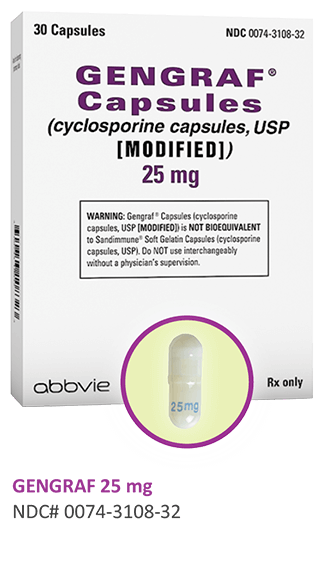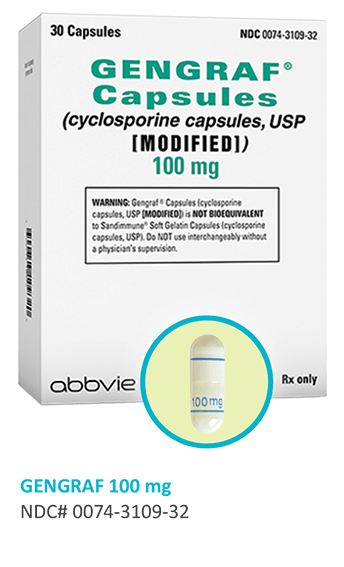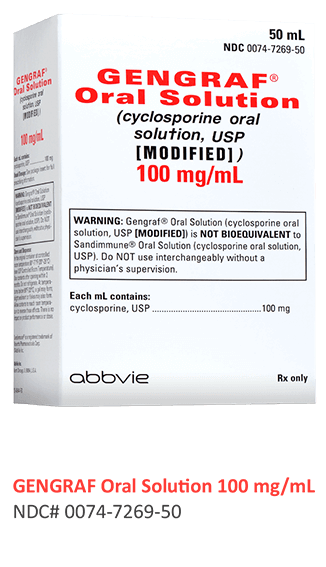


Use GENGRAF as prescribed by your doctor. Read all information given to you. Follow all instructions closely.1,2
Dosage and administration1,2
Dosing for newly transplanted patients1,2
What if you miss a dose?3
Switching to another modified cyclosporine should be handled with extreme caution.
Safety Considerations1,2
*Sandimmune is a registered trademark of Novartis Pharmaceuticals Corporation.
GENGRAF® Capsules (cyclosporine capsules, USP [MODIFIED]) and GENGRAF® Oral Solution (cyclosporine oral solution, USP [MODIFIED]) are prescription medicines used to help prevent organ rejection in people who have received a kidney, liver, or heart transplant. Cyclosporine (MODIFIED) has been used with other immunosuppressants, such as azathioprine and corticosteroids.
While you are on this treatment, it is important to be under the care of a doctor who has experience treating and monitoring organ transplant patients who are taking medicines like GENGRAF.
GENGRAF is an immunosuppressant, a drug that reduces the body’s ability to fight illness and disease. Immunosuppressant drugs may increase your chances of getting an infection and certain types of cancers. In organ transplant patients, using GENGRAF with other immunosuppressants may increase this effect.
Different formulations of cyclosporine deliver different amounts of medicine. Do not switch formulations of cyclosporine without your doctor’s permission and direction, as switching formulations may require a dosage change.
GENGRAF can cause high blood pressure and kidney problems. This risk increases the longer you take GENGRAF and with higher doses. Ongoing laboratory tests must be performed to monitor your kidney function while you are being treated with GENGRAF.
References:
1. GENGRAF Capsules [package insert]. North Chicago, IL: AbbVie Inc.
2. GENGRAF Oral Solution [package insert]. North Chicago, IL: AbbVie Inc.
3. GENGRAF (Capsules, Modified). Drugs.com website. https://www.drugs.com/cdi/gengraf-cyclosporine-capsules-modified.html. Accessed July 24, 2020.
4. Kasiske BL, Zeier MG, Chapman JR, et al. KDIGO clinical practice guideline for the care of kidney transplant recipients: a summary. Kidney Int. 2010;77(4):299-311.
Please see full Prescribing Information for additional information about GENGRAF Capsules.
Please see full Prescribing Information for additional information about GENGRAF Oral Solution.
You are encouraged to report negative side effects of prescription drugs to the FDA. Visit www.fda.gov/medwatch or call 1-800-FDA-1088.
If you are having difficulty paying for your medicine, AbbVie may be able to help. Visit AbbVie.com/myAbbVieAssist to learn more.
If you have any questions about AbbVie's Gengraf.com website that have not been answered, click here. This website and the information contained herein is intended for use by U.S. residents only and is provided for informational purposes only.
GENGRAF® Capsules (cyclosporine capsules, USP [MODIFIED]) and GENGRAF® Oral Solution (cyclosporine oral solution, USP [MODIFIED]) are prescription medicines used to help prevent organ rejection in people who have received a kidney, liver, or heart transplant. Cyclosporine (MODIFIED) has been used with other immunosuppressants, such as azathioprine and corticosteroids.
While you are on this treatment, it is important to be under the care of a doctor who has experience treating and monitoring organ transplant patients who are taking medicines like GENGRAF.
GENGRAF is an immunosuppressant, a drug that reduces the body’s ability to fight illness and disease. Immunosuppressant drugs may increase your chances of getting an infection and certain types of cancers. In organ transplant patients, using GENGRAF with other immunosuppressants may increase this effect.
Different formulations of cyclosporine deliver different amounts of medicine. Do not switch formulations of cyclosporine without your doctor’s permission and direction, as switching formulations may require a dosage change.
GENGRAF can cause high blood pressure and kidney problems. This risk increases the longer you take GENGRAF and with higher doses. Ongoing laboratory tests must be performed to monitor your kidney function while you are being treated with GENGRAF.